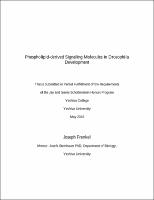Please use this identifier to cite or link to this item:
https://hdl.handle.net/20.500.12202/4104Full metadata record
| DC Field | Value | Language |
|---|---|---|
| dc.contributor.author | Frenkel, Joseph | |
| dc.date.accessioned | 2018-11-06T19:08:41Z | |
| dc.date.available | 2018-11-06T19:08:41Z | |
| dc.date.issued | 2016-05 | |
| dc.identifier.uri | https://hdl.handle.net/20.500.12202/4104 | |
| dc.identifier.uri | https://ezproxy.yu.edu/login?url=https://repository.yu.edu/handle/20.500.12202/4104 | |
| dc.description | The file is restricted for YU community access only. | |
| dc.description.abstract | Fatty acids are precursors of potent lipid signaling molecules. They are stored in membrane phospholipids and released by phospholipase A2s (PLA2s). Lysophospholipid acyltransferases (ATs) oppose PLA2s by re-esterifying fatty acids into phospholipids, in a biochemical pathway known as the Lands Cycle (shown in figure 1). Drosophila Lands Cycle ATs Oys and Nes, as well as seven predicted PLA2 genes, are expressed in the male reproductive tract (see figure 2). As shown in Ben-David et al. 2015, Oys and Nes are required for spermatid individualization1 . Individualization, which occurs after terminal differentiation, invests each spermatid in its own plasma membrane and removes the bulk of the cytoplasmic contents. In previous experiments, the Steinhauer lab developed a quantitative assay to measure individualization defects and demonstrated that this process is highly abnormal in oys nes double mutants1 . This process also is disrupted by mutations in the cyclooxygenase Pxt, which converts fatty acids into prostaglandin signaling molecules, but not by other phospholipid metabolism pathway mutants2 (figure 1). Together, these results suggest that fatty acid signaling controls spermatid individualization. Following these results, we set out to explore if reducing PLA2 activity (specifically iPLA2) would have similar effects on spermatogenesis and/or other aspects of development. | en_US |
| dc.description.sponsorship | Jay and Jeanie Schottenstein Honors Program | en_US |
| dc.language.iso | en_US | en_US |
| dc.publisher | Yeshiva College | en_US |
| dc.rights | Attribution-NonCommercial-NoDerivs 3.0 United States | * |
| dc.rights.uri | http://creativecommons.org/licenses/by-nc-nd/3.0/us/ | * |
| dc.subject | Drosophila --Life cycles. | en_US |
| dc.subject | Drosophila --Genetics. | en_US |
| dc.subject | Drosophila --Research. | en_US |
| dc.subject | Drosophila --Development. | en_US |
| dc.subject | Dissertations, Academic. | en_US |
| dc.title | Phospholipid-derived Signaling Molecules in Drosophila Development | en_US |
| dc.type | Thesis | en_US |
| Appears in Collections: | Jay and Jeanie Schottenstein Honors Student Theses | |
Files in This Item:
| File | Description | Size | Format | |
|---|---|---|---|---|
| Joseph-Frenkel.pdf Restricted Access | 2.12 MB | Adobe PDF |  View/Open |
This item is licensed under a Creative Commons License

